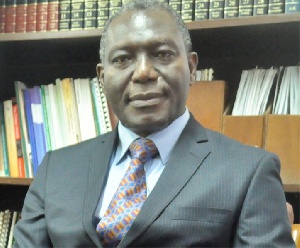Director for Council for Scientific and Industrial Research CSIR- STEPRI, Dr. George Essegbey, has observed that the poor performance of the various sectors of Ghana’s economy could partly be attributed to the limited effective application of advances in research and development.
He said countries are classified into industrialized, newly industrialized and developing countries based on the differences in the extent at which they incorporate science, technology and innovation, as well as other research outputs in their developmental process.
“Regrettably, the premium placed on science, technology and innovation (STI) in Ghana as the main drivers of development appear not have been taken seriously by policy makers and managers of the nation’s resources”, the director further observed.
Dr. Essegbey disclosed that the proportion of the nation’s budget allocated to STI, fluctuates between 0.3 percent and 0.5 percent of Gross Domestic Product (GDP), whereas South Korea, Singapore and Taiwan have been spending 2 percent of their GDP to cause the kind of transformation the countries are experiencing currently.
The Director was giving the key note address at the 3rd edition of Accra Institute of Technology’s (AIT) International Research Initiatives Conference (IRIC-2016), held in Accra on Wednesday.
IRIC seeks to become an annual international research-focused conference that serves as an international forum for presenting and discussion of outputs of on-going cutting-edge research efforts and initiatives of researchers in the universities, research institutions and industry.
“Our ambition as a country that aspires to become an upper middle-income country requires a vision of development which fully applies and integrates science, technology and innovation as well as other research and development outputs into national development strategies to harness fully the nation’s total science and technology capacity to achieve national objectives for poverty reduction, competitiveness of enterprises, sustainable environmental management and industrial growth”, Dr. Essegbey suggested.
For the transformation of Ghana, he estimated that indigenous researchers need to be supported to move to the frontiers of scientific knowledge to search for solutions to the myriad of developmental challenges facing Ghana.
The CSIR director appealed to policy makers to formulate policies and ensure their implementation in the National Innovation System (NIS), with which all stakeholders will perform key roles and interact to bring about innovation.
“Researchers are generating new knowledge and producing new technologies in the NIS and investors and entrepreneurs are adopting and translating these technologies into useful or profitable innovations in the market place and society”, he disclosed.
Professor Walter Alhassan, member of the advisory Council of AIT, who was also the Chairman of the event, believes IRIC will steadily enhance the development of Academic-Industry-Public Partnerships (AIPPs) in Ghana and other African countries.
He said such partnership has the potential of generating multiplier effects such as demonstrating the importance of research and development, creating a private sector that is supportive to the implementation and financing of research and development as well as encouraging government support to innovation.
Some of the topics discussed during the conference included Business, Management and Entrepreneurship, Engineering Advancement and Innovation and Advances in Computing Science.
The rest were Education Technology and Innovation, Engineering Advancement and Innovation, Entrepreneurship, Health, Energy and Environment and Agriculture Technology and Innovation
Regional News of Thursday, 27 October 2016
Source: myradio360.com

















